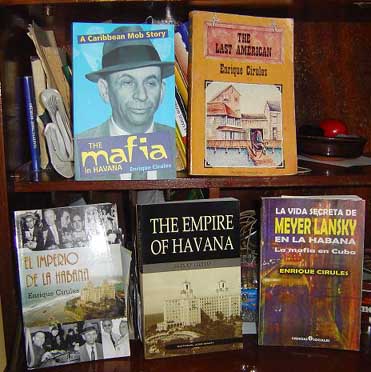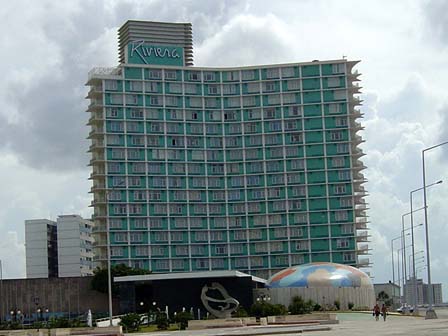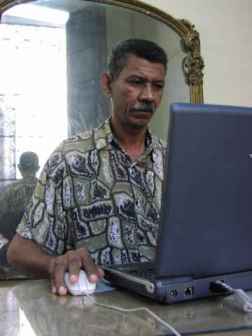Enrique Cirules, his books and general Fulgencio Batista
Lázaro David Najarro Pujol
 I met Enrique Cirules (Nuevitas, 1938) some 30 years ago, when I used to visit the old squares and parks of Camagüey, and participated in literary gatherings. By those days, Cirules was writing short stories of fishermen and turtle hunters.
I met Enrique Cirules (Nuevitas, 1938) some 30 years ago, when I used to visit the old squares and parks of Camagüey, and participated in literary gatherings. By those days, Cirules was writing short stories of fishermen and turtle hunters.
In several occasions, we sailed along the labyrinths of Doce Leguas, in the archipelago Jardines de la Reina. We sailed across keys and small isles in search of adventures, anecdotes and information for his book Los Guardafronteras.
Nowadays, Cirules is the author of several novels, essays, testimonies and short stories; and some of his books have had international recognition.
His wide literary work has reflected diverse topics. He has written about love, war and also about the North American peasants who founded the towns located in the north of Camagüey. But also he has treated, in a very sharp way, the presence of the North American mafia in Cuba.
P: Some readers assure that Conversation with the last North American is your best book.
E. C.: I do not deny that I treated with fascination certain characters of La Gloria City; perhaps that was due to the fact that this topic wasn’t incorporated into the Cuban literature yet. It was awesome for me to be in those villages, with personages of a great energy, of great tenderness. Human beings that were capable of creating real legends, spots for the myth, and these things are always very edifying for a writer; but I think that the best book of a writer is the one he has not written yet.
P: You have also written stories of coastguard troopers; has written essays, has been an analyst in history, and has tackled unknown aspects about the work and life of Ernest Hemingway. That's the reason why some people have dared to assert that you are more a historian than a novelist?
E. C.: C: I am not a historian, absolutely no, though you can not forget that every novel happens in a certain historical context. I am fascinated by the possibilities the novel offers. What happens is that sometimes I have treated unknown topics in the Cuban literature. I would rather say that unusual topics in the Cuban culture. For that purpose, I have had to look for responses in the historical analysis, and solutions for its formal structures. Responses that were not sufficiently argued.
P: Did something like that happen with the books on the mafia?
E. C.: In a way, yes. Firstly, I was thinking to write a novel; but during the research what I began to discover was awesome. Then, I understood that the novel was not the suitable instrument. Before the launch of El Imperio de La Habana, not a single word had been written on the presence of the North American mafia in Cuba.
P: Soon Letras Cubanas is going to publish Santa Clara Santa. Is this a real story or a fiction?
 E. C.: It is a novel, with more than 50 characters and four storylines. Only that.
E. C.: It is a novel, with more than 50 characters and four storylines. Only that.
P: There are other novels: I mean La saga de La Gloria City, Bluefields, perhaps Extraña lluvia en la tormenta, which are difficult to find in the bookstores.
E. C.: The editions of those novels were small, around five, ten thousand copies; though Bluefields was also published in Brazil, and La saga… was read in the United States, distributed by the publishing house Vitral.
P: Among your storybooks: Los perseguidos, La otra guerra, Luces sobre el canal: why so many tales about fishermen, turtle hunters and sailors?
E. C.: The fact is that I was born in a charming marine region, near the Romano archipelago, places in which the people who live there had a fabulous collective memory , I had the privilege to meet many of those people.
P: Being a novelist; how do you explain than in some of your conferences, in Casa de las Americas or in the Centro Dulce Maria Loynaz, you did so much emphasis on real personages, let's say Aureliano Sánchez Arango, Orestes Ferrara or Fulgencio Batista?
E. C.: Those were personages who darkened the complex history of Cuba, and have not been sufficiently studied. I remember that in several times Moreno Fraginals urged me to write a novel on the histories of Julio Lobo, histories that he had told me. They were very weighty, unknown anecdotes that always turn out to be very captivating; but I have never decided to write such a novel.
On the other hand, Batista was the tip of the iceberg of the whole epoch. He was the man who, from the apparent power, helped to create one of the biggest mafia empires of the 20th century.
P: Nevertheless, there are attempts nowadays to present him as a great antifascist.
E. C.: This is a very difficult task, in spite of all the money that they could invest on this project. Batista stole more than 600 millions from Cuba, and left a big trail of blood. They can get all the best magicians of the universe together, and they will not be able to vindicate his actions. It is very unlikely though, that they can find magicians who accept such an unworthy work.
P: Anyway, a sham after another sham could create confusion on some people.
E. C.: Not in this case. Confusions might be temporary, the public opinion is not characterized for being stupid. In addition, Batista’s dictatorship in Cuba was not an isolated event, it was a dictatorship that lasted the whole epoch, coinciding with numerous dictatorships. It was a strategy, a policy conceived for Latin America and the Caribbean: Somoza, in Nicaragua; Duvalier, in Haiti; Rojas Pinilla, in Colombia; Pérez Jiménez, in Venezuela; Trujillo, in Dominican Republic; Stroessner, in Paraguay, and later Videla, in Argentina; Ernesto Geisel, in Brazil, and Pinochet, in Chile, among others. An excellent gang of killers, and any attempt for erasing the real history is a failure.
Over the latest years, I have been writing a fascinating book on La Gloria City. It is about a feminine character who lived in the valley of Cubitas for more than 20 years. She was a truly fabulous personage, who was capable of creating a great legend. It is about the mythical story of Mrs. Emily Blackwell, and I haven’t had much time to be informed about the diverse mechanisms of the press; but in any case what they are going to achieve is to open up a debate on the presence of general Batista in Cuba.
P: Would you take part in such a debate?
E. C.: Over 15 years ago I was working on a book draft concerning the coup d'état occurred in 1952. I did participate, I have it; and if the topic is of current interest, my books will be present.
P: What could happen then?
E. C.: First of all, any new debate about general Batista will be of much interest for the North American public. Batista draws a very sordid history; and whatever the intention might be, the issue Batista will uncover, now more than ever, the presence of the torturers, killers, gangsters, delinquents and corrupt politicians, who were welcomed by numbers in the United States, long before Fidel Castro said something about socialism.
P: Do you believe then that all this matter would be more reveling?
 E. C.: Undoubtedly. The people is going to wonder how it was possible that a simple sergeant stenographer could become a general – president in only seven years. Persecutions, tortures and murders that characterized the whole epoch will be revealed once again. The people will remember his business linked to the prostitution, the usurpation of the movement September 4th; and above all, the arrangements that he made with the North American mafia for the opening of chains of casinos, brothels and channels of the drug dealing.
E. C.: Undoubtedly. The people is going to wonder how it was possible that a simple sergeant stenographer could become a general – president in only seven years. Persecutions, tortures and murders that characterized the whole epoch will be revealed once again. The people will remember his business linked to the prostitution, the usurpation of the movement September 4th; and above all, the arrangements that he made with the North American mafia for the opening of chains of casinos, brothels and channels of the drug dealing.
Not only in the 30s. This will rake up the secret operations organized by the special services, so that Batista could manipulate the events happened during the World War II. So, how you can explain that already in 1940, Batista had turned Cuba into the most active international center for the drugs trafficking.
According to official data, Cuba was ranked first in the drug trafficking worldwide. The drug consumed in the United States was embarked in Cuba.
P: Up to the World War II?
E. C.: And later. Till 1958. The world is going to show a lot of interest on how the they could made the political transition to the Authentic Party, in 1944; and the maneuvers of Fulgencio Batista and Meyer Lansky to impose an early tropical McCartyism in Cuba, using dozens and dozens of armed gangs, that turned the streets of Havana into true battlefields. Meanwhile Lansky was outlining the arrangements for the opening of Las Vegas, and, from his temporary refuge in Daytona Beach, he kept on manipulating the Cuban politics.
 P: This is something that you already treat in El imperio de La Habana; but with the publication of The secret life of Meyer Lansky, one has the impression that we are before one of the biggest projects of corruption in the 20th century.
P: This is something that you already treat in El imperio de La Habana; but with the publication of The secret life of Meyer Lansky, one has the impression that we are before one of the biggest projects of corruption in the 20th century.
E. C.: The secret life of Meyer Lansky is a delightful book. It is one of more revealing testimonies of those years. A memory book of a person who was chauffeur and bodyguard of the chief of the Mafia Clan Havana - Las Vegas between 1957-1958. It is a faithful and fascinating reconstruction of Havana in the 50’s. For the first time, passages of the life of the most important, invisible and crafty personage of the North American mafia could be reconstructed. A book that relates Meyer Lansky’s passions, loves, nostalgias and methods, in the middle of special circumstances, when the future of the US mafia was at stake.
P: But let's return to Batista …
E. C.: Well, what else I could add: everything what this Batista matter can stir up, including the covert operations for the coup d'état of 1952; and especially, the big project directed to turning the dazzling Havana into the most incredible heaven for the stinginess, the dispossession and the corruption of United States could proliferate. And this is something the North American people will never forgive Batista.
Enrique Cirules continues with his literary projects, in which he has advanced a lot and about which we will treat in another interview with the author of Conversación con el último norteamericano, not the best title of the writer, because as he says
"... the best book of a writer is that one that he hasn’t written yet".
 Lázaro David Najarro Pujol, escritor y periodista.
Lázaro David Najarro Pujol, escritor y periodista.
Labora en la emisora Radio Cadena Agramonte de Camagüey.
Autor de los libros Emboscada y Tiro de Gracia,
ambos publicados por la Editorial Ácana de Camagüey.
Editor del Sitio Web: http://camaguebax.awardspace.com/




![]() Cuba. Una identità in movimento
Cuba. Una identità in movimento![]()